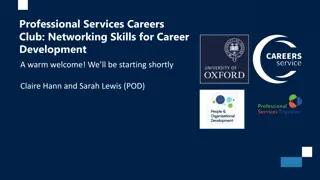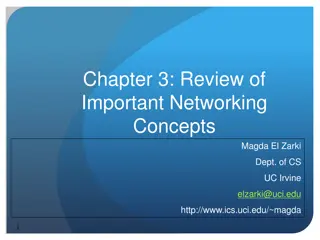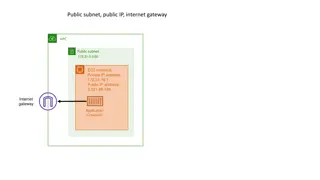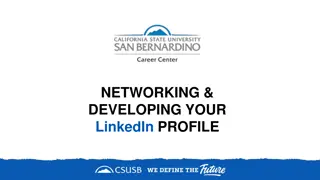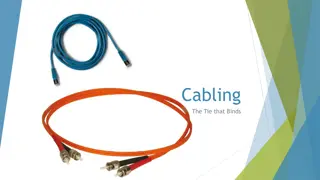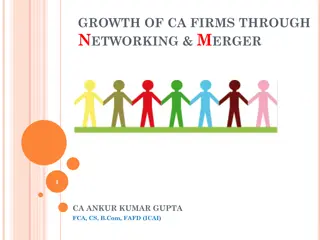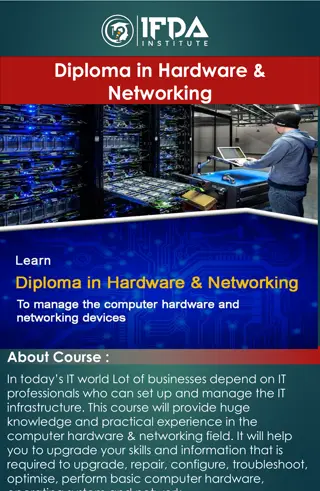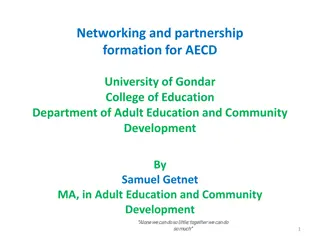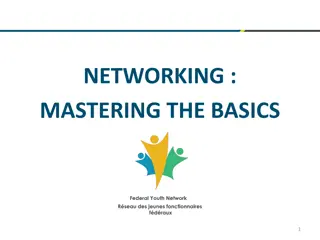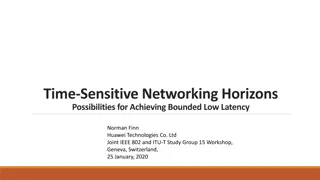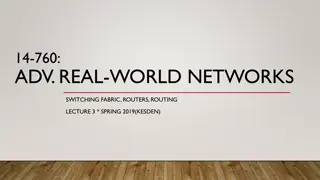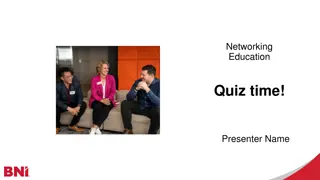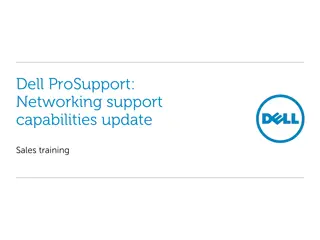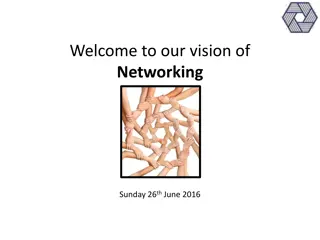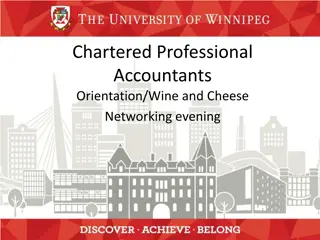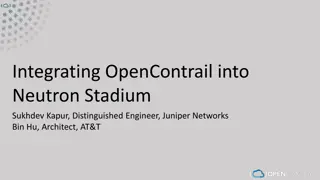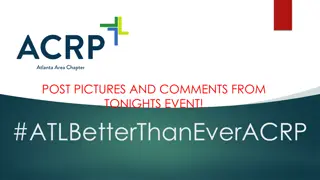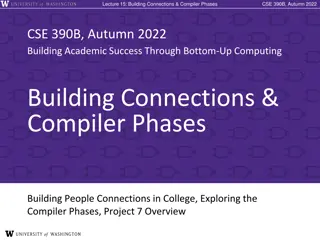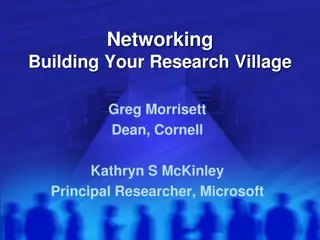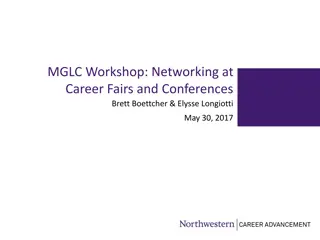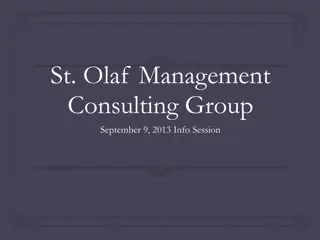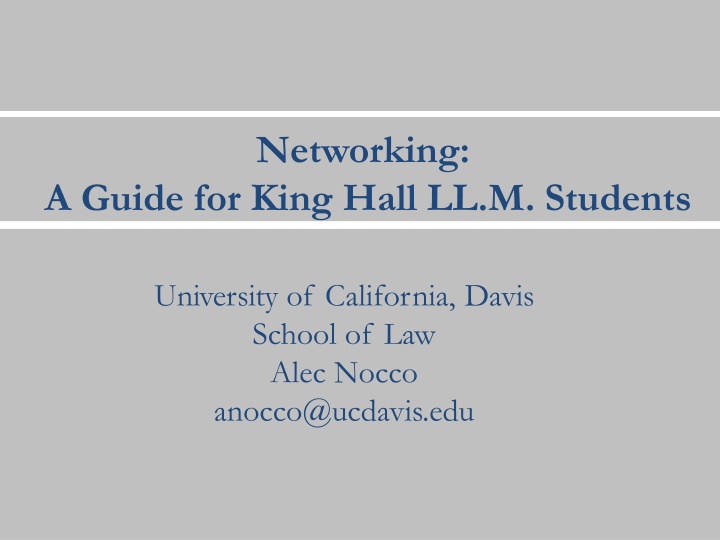
Networking Guide for King Hall LL.M. Students at UC Davis School of Law
"Learn the importance of networking for law students, when and how to network effectively, and valuable tips for building connections in the legal field at UC Davis School of Law's King Hall. Start networking now to enhance your career prospects!"
Download Presentation

Please find below an Image/Link to download the presentation.
The content on the website is provided AS IS for your information and personal use only. It may not be sold, licensed, or shared on other websites without obtaining consent from the author. If you encounter any issues during the download, it is possible that the publisher has removed the file from their server.
You are allowed to download the files provided on this website for personal or commercial use, subject to the condition that they are used lawfully. All files are the property of their respective owners.
The content on the website is provided AS IS for your information and personal use only. It may not be sold, licensed, or shared on other websites without obtaining consent from the author.
E N D
Presentation Transcript
Networking: A Guide for King Hall LL.M. Students University of California, Davis School of Law Alec Nocco anocco@ucdavis.edu
Agenda I. What is Networking? II. Why Should I Network? III. When Should I Network? IV. How Do I Network?
What Is Networking? Giving people a chance to get to know you (on a basis other than your resume) More than simply handing out resumes or business cards Focus on making connections Learning more about a business/area of law that interests you Meeting interesting people Remember: If networking makes you nervous or uncomfortable, you re not alone!
Why? It works Conservative estimates: 60-70% professional jobs are found through networking Students with GPAs all over the spectrum have landed positions through networking It is skill that you will use throughout your career
When? NOW! It s never too early to network it takes time to build connections. Set quantifiable goals: E.g., set up LinkedIn page; attend 2 events per month; conduct 1 informational interview a month. o For King Hall event listings, check Career Services Office e-news, King Hall e-newsletter, website, weekly LSA e-mail o Check industry publications, Bar Association websites, etc.
Networking Who, How, When, and Why? Who do you know? Friends and Family Friends of your family People you or your fellow students meet at events Former co-workers Professors Alumni
Who? Identifying Others Identifying people you don t know but should: Alumni Directory https://intranet.law.ucdavis.edu/community/alumni/index.aspx Join Bar Associations, Affinity Groups, and Practice Specific groups Job Resources Page (Private Practice) http://www.law.ucdavis.edu/current/career-services/job-resources.html Martindale Small and Midsize Firm Guide Meeting one person often leads to more contacts so always ask No harm if they do not respond (same position that you are in before contact) but run approach by CSO
Who Alumni and Others Personal connections and Alumni are the low-hanging fruit When you identify potential employer, check for alumni Website search Check alumni directory can search by employer No alumni now what? Study bios and see if there is a connection Common interest Undergrad connection Even if no connection still reach out
How to Network? Start with who you already know LinkedIn Ask about: Background Current position What they like about their job Advice about important skills and valuable experiences Get referrals Who else should I meet? Don t forget to follow up and say thank you!
HOW? COVID19 Edition Virtual Informational Meetings Virtual Events Virtual Coffee
How Informational Meeting E-mail (short) or call? Ask to meet for coffee or by phone (in-person is best) to discuss their practice Show interest in firm, entity, organization Do NOT ask for a job with first contact Keep Excel Spreadsheet to track who you contact and individual notes Suggest working on an article/blog together after your first meeting
How to Network: Introductory Email Sample e-mail Dear Mr. Jones: I am a LL.M. student at UC Davis School of Law. I am interested in real estate and land use law because of my prior work experience in the real estate industry and my exposure to real estate and land use issues through my coursework. I was given your name and number by Jennifer Smith who suggested I contact you since you have expertise in this area. Would you have 15-20 minutes to discuss your area of law, your firm, industry trends, and the state of the legal market in Sacramento? I have attached my current resume for your reference, and would appreciate any opportunity to get your feedback and any advice you might have for me. I look forward to hearing from you. Thank you. Sincerely, Andrea Burnett
How Guidelines for Informational Meeting Ask for information not a job However can ask for advice on how best to get your foot in the door Always bring resumes attach to e-mail if virtual Ask for advice, how they got started, thoughts on your resume, what they would do in your situation etc. they may pass along your resume if they are impressed Ask if they know of others, based on your interests that you should talk to Always say and send thank you
How to Network: Informational Interviews Not a job interview, more of a conversation In addition to personal referrals, look for contacts through the alumni directory, Martindale, LinkedIn, etc. Call or send introductory email Ask for phone chat, coffee meeting, etc. Follow up to set up time to talk
How to Network: Networking Events When attending a networking event, research beforehand who will be there and how they might be valuable for you to meet. If possible, arrange meetings in advance, including informational interviews. Talk to people seated near you. Step outside your comfort zone and approach people whose body language suggests they re ready to talk. Talk to speaker after event. Offer to volunteer.
How to Network: Dos and Donts Don t ask directly for a job or plan to hand out r sum s. Don t just talk about your legal interests and ambitions think about what else makes you distinctive. Do ask open ended questions ( Tell me about your ). Do discuss legal issues that you ve read about to demonstrate your depth. Do be careful about touchy subjects like politics and religion. Do listen more than you talk, and ask for plenty of advice. When networking opportunities arise outside of traditional networking events, do be tuned into the attorney s interest level.
How The Event is Over, Now What? Make notes on the business cards that you have received Connect on Linkedin Enter your new contacts into spreadsheet Name Employer Practice area What you talked about If there was a connection, send a follow-up e-mail
How to Network: Physical Impressions Smile Lean forward, but don t invade personal space Appropriately strong handshake Appropriate attire at all business functions and informational interviews Read signals
How to Network: Social Media Google yourself first! Read industry blogs Comment on someone s blog and become familiar to them (positive comments only!) LinkedIn, Facebook Join industry, alumni groups Make sure your profiles are professional
How to Network: Staying in Touch Find a way to stay in touch Getting someone else s business card works better than handing out yours Find a reason to follow-up other than asking for a job Share an article of interest Saw mutual friend/met with recommended contact New year, will be in town, graduated, passed bar, still seeking, etc. Follow up the next day two at most and keep keeping in touch. Keep Records Excel spreadsheet, word document, etc.

